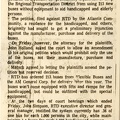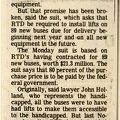Denver Post
RTD, Handicapped Protesters Come to Undisclosed Accord
By: Howard Pankratz, Denver Post Legal Affairs Writer
Heeding a judge’s advice that a court-imposed resolution of their differences could lead only to more problems, handicapped Denver residents and the Regional Transportation District Friday hammered out a solution to their dispute.
Although the agreement’s terms won’t be made public until a court hearing February 2, representatives of RTD and the handicapped seemed quite pleased with the accord. A compromise was suggested by Denver District Judge Daniel Sparr.
It ended a hectic several weeks during which RTD property has been the scene of demonstrations by wheelchair-bound handicapped and in which RTD sought a court order to prevent such demonstrations.
The demonstrations were sparked by a decision of the RTD board of directors not to place wheelchair lifts on 89 high-capacity, articulated buses to be added to the RTD bus fleet in 1993.
The RTD responded by going to court, seeking a court ban on demonstrations.
But on Thursday, saying he was convinced the gulf between the handicapped and RTD would widen if he entered a court order at RTD request, Sparr called both sides into his chambers. He strongly suggested they work out an agreement among themselves.
At all costs, Sparr told them, he wanted to avoid an “us-against-them” climate on both sides, which he said would result if he were forced to rule on RTD's motion for a temporary restraining order.
After a total of five hours of talks Thursday and Friday, an agreement was reached.
Both sides praised Sparr.
“I think Sparr took the correct approach,” said RTD attorney Russ Richardson. “I believe his philosophy is right. When I was in private practice, I advised clients in divorce proceedings that agreements between them and their spouses were much better than a settlement imposed by the court. Court action is one-sided. One side will lose, or sometimes both sides will lose.”
John Holland, representing the Atlantis Community for the disabled, said neither side really desired a restraining order and recognized each had rights. Holland said that the agreement is a “fair adjustment of those rights.”
Holland added both sides “found out how to relate to each other. I think talking about it, and the judge’s input, were creative,” said the attorney for the handicapped.
Richardson said that as part of the agreement, RTD will no longer seek the restraining order.
- Created on
- Wednesday 10 July 2013
- Posted on
- Tuesday 10 May 2016
- Tags
- articulated buses, demonstrations, John Holland, Judge Sparr, negotiations, RTD, wheelchair bound
- Albums
- Visits
- 1950
- Rating score
- no rate
- Rate this photo


0 comments